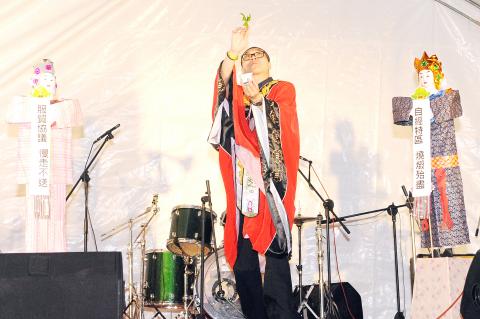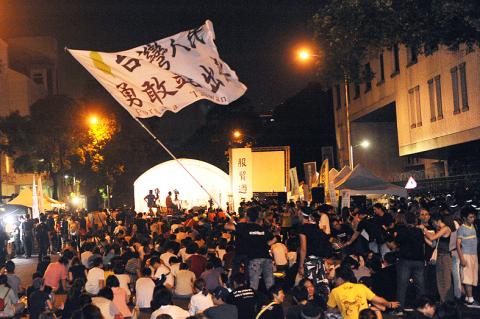Hundreds of people marked the first anniversary of the signing of the cross-strait service trade agreement with a protest outside the Legislative Yuan in Taipei last night.
Decorating the stage with ornaments traditionally used for funeral events, such as white banners, pairs of paper dolls, mini pagodas and canned drinks, the protesters, mobilized by the Black Island Youth Front and the Taiwan March and Democracy Tautin, started the rally with a student dressed in a Taoist priest’s outfit performing an exorcism.
“May the cross-strait service trade agreement have a safe passage to the underworld,” he said. “May the free economic pilot zones perish. President Ma Ying-jeou’s [馬英九] government, go ahead and cross the bridge.”

Photo: Chen Chih-chu, Taipei Times
The crowd, many who also took part in the 23-day occupation of the legislative floor in March, shouted chants that are usually cited during funerals.
The call for the government to cross the bridge comes from the folk belief that there is a bridge connecting the world of the living and the world of the dead. Since the spirits of the newly dead are confused, not knowing where to go, the Taoist priest and the family of the deceased must shout to direct him or her to cross the bridge to the underworld.
“The purpose of the ritual is to send away all the ‘dirty things,’ and the dirtiest thing in this country is the government under Ma’s leadership,” said Dennis Wei (魏揚), a Sunflower movement student leader. “If the government hasn’t learned its lesson by attempting to pass the cross-strait service trade agreement and it still want to pass the pilot zones plan by force, we will not hesitate to fight it.”

Photo: Chen Chih-chu, Taipei Times
One of the reasons the groups organized the rally is because Ma, who doubles as chairman of the Chinese Nationalist Party (KMT), had earlier asked the KMT caucus to put all its efforts into passing the cross-strait service trade agreement and the bills on pilot zones during an extra legislative session which started last week and is scheduled to last three weeks, Wei said.
Taiwan Association of University Professors chairman Lu Chung-chin (呂忠津) expressed his concern about the negative impact that the two economic plans might have on the nation.
“The so-called pilot zones are actually a backdoor for privileged commercial groups and through these groups China can apply its political influence bit by bit,” Lu said. “Instead of taking up its responsibilities to boost the declining economy, the Ma administration has unilaterally decided to play the game of patronage, bringing in Chinese forces and helping them take over Taiwan through economic means.”
Between speeches, several independent musicians and bands performed to show their support for the protesters.
To prevent the occupation of the legislature from happening again, police surrounded the legislature with barbed-wire barricades more than a week ago. In the afternoon, police reinforced the barricades by fixing them to the ground, connecting them together and blocking most of the gates that lead to legislative compound.
A police source said that in addition to the regular force stationed at the Legislative Yuan, as many as 360 more officers were deployed.

SECURITY: As China is ‘reshaping’ Hong Kong’s population, Taiwan must raise the eligibility threshold for applications from Hong Kongers, Chiu Chui-cheng said When Hong Kong and Macau citizens apply for residency in Taiwan, it would be under a new category that includes a “national security observation period,” Mainland Affairs Council (MAC) Minister Chiu Chui-cheng (邱垂正) said yesterday. President William Lai (賴清德) on March 13 announced 17 strategies to counter China’s aggression toward Taiwan, including incorporating national security considerations into the review process for residency applications from Hong Kong and Macau citizens. The situation in Hong Kong is constantly changing, Chiu said to media yesterday on the sidelines of the Taipei Technology Run hosted by the Taipei Neihu Technology Park Development Association. With

CARROT AND STICK: While unrelenting in its military threats, China attracted nearly 40,000 Taiwanese to over 400 business events last year Nearly 40,000 Taiwanese last year joined industry events in China, such as conferences and trade fairs, supported by the Chinese government, a study showed yesterday, as Beijing ramps up a charm offensive toward Taipei alongside military pressure. China has long taken a carrot-and-stick approach to Taiwan, threatening it with the prospect of military action while reaching out to those it believes are amenable to Beijing’s point of view. Taiwanese security officials are wary of what they see as Beijing’s influence campaigns to sway public opinion after Taipei and Beijing gradually resumed travel links halted by the COVID-19 pandemic, but the scale of

A US Marine Corps regiment equipped with Naval Strike Missiles (NSM) is set to participate in the upcoming Balikatan 25 exercise in the Luzon Strait, marking the system’s first-ever deployment in the Philippines. US and Philippine officials have separately confirmed that the Navy Marine Expeditionary Ship Interdiction System (NMESIS) — the mobile launch platform for the Naval Strike Missile — would take part in the joint exercise. The missiles are being deployed to “a strategic first island chain chokepoint” in the waters between Taiwan proper and the Philippines, US-based Naval News reported. “The Luzon Strait and Bashi Channel represent a critical access

Pope Francis is be laid to rest on Saturday after lying in state for three days in St Peter’s Basilica, where the faithful are expected to flock to pay their respects to history’s first Latin American pontiff. The cardinals met yesterday in the Vatican’s synod hall to chart the next steps before a conclave begins to choose Francis’ successor, as condolences poured in from around the world. According to current norms, the conclave must begin between May 5 and 10. The cardinals set the funeral for Saturday at 10am in St Peter’s Square, to be celebrated by the dean of the College